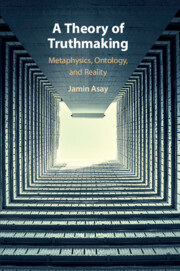Book contents
- A Theory of Truthmaking
- A Theory of Truthmaking
- Copyright page
- Dedication
- Contents
- Preface
- Introduction
- Part I Foundations
- Chapter 1 A Methodology for Truthmaking
- Chapter 2 Truthmaking, Accounting, and Explanation
- Chapter 3 The Truthmaking Relation
- Chapter 4 Truthmaker Maximalism and the Scope of Truthmaking
- Chapter 5 A Catalog of Objections
- Part II Applications
- Part III Metaphysics
- Conclusion
- References
- Index
Chapter 1 - A Methodology for Truthmaking
from Part I - Foundations
Published online by Cambridge University Press: 18 April 2020
- A Theory of Truthmaking
- A Theory of Truthmaking
- Copyright page
- Dedication
- Contents
- Preface
- Introduction
- Part I Foundations
- Chapter 1 A Methodology for Truthmaking
- Chapter 2 Truthmaking, Accounting, and Explanation
- Chapter 3 The Truthmaking Relation
- Chapter 4 Truthmaker Maximalism and the Scope of Truthmaking
- Chapter 5 A Catalog of Objections
- Part II Applications
- Part III Metaphysics
- Conclusion
- References
- Index
Summary
To be a truthmaker theorist is not to accept any particular metaphysical doctrine; nearly every thesis under discussion within truthmaker theory is contentious. Rather, it is to adopt a methodology, to confront metaphysical questions with the tools and resources of truthmaker theory. As a result, taking truthmaking seriously need not come with some of the more controversial commitments that have long been associated with it, such as the doctrine that all truths require truthmakers, or that entities such as facts or states of affairs exist. Those are positions that one may ultimately stake out, but they are not ones that are required from the outset. So what form should truthmaking arguments take? What kind of theory should truthmaker theorists endeavor to produce? What assumptions are truthmaker theorists allowed to hold when exploring their inquiries? This chapter presents a general framework for developing a theory of truthmakers, and highlights the various choice points that theorists must confront. It defends the view that to be is to be a truthmaker, and that “cheater catching” is an unhelpful way of understanding truthmaker theory.
- Type
- Chapter
- Information
- A Theory of TruthmakingMetaphysics, Ontology, and Reality, pp. 17 - 30Publisher: Cambridge University PressPrint publication year: 2020

